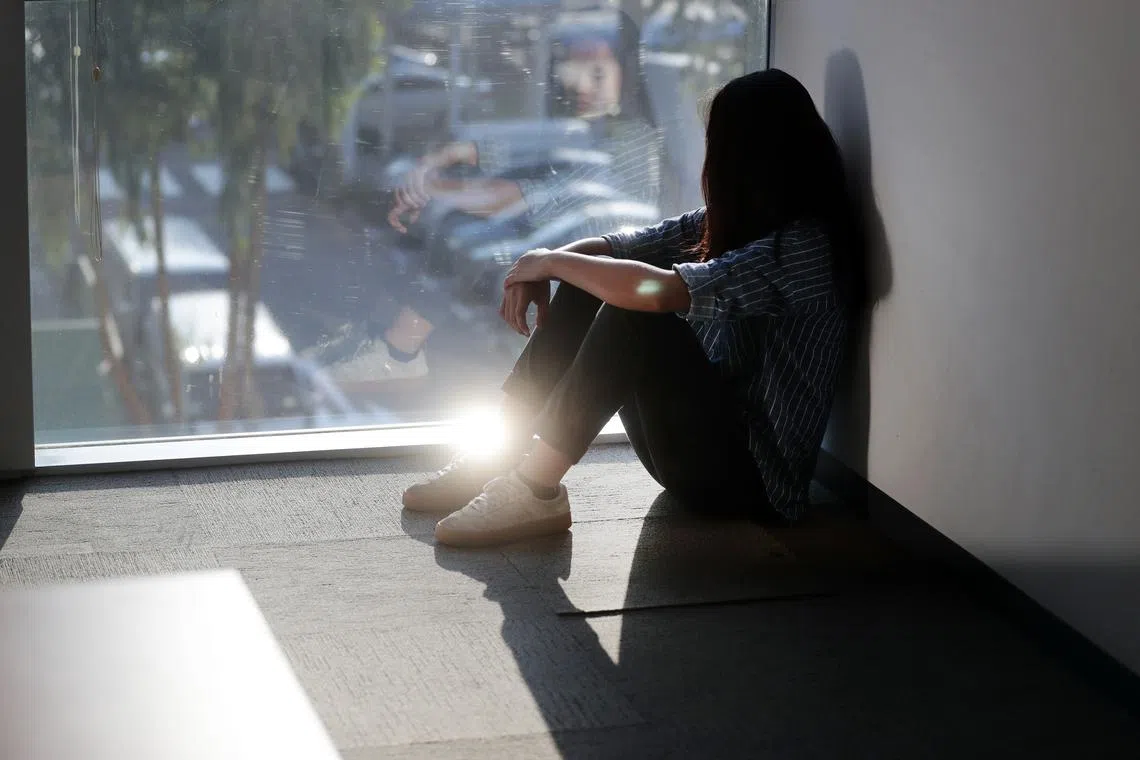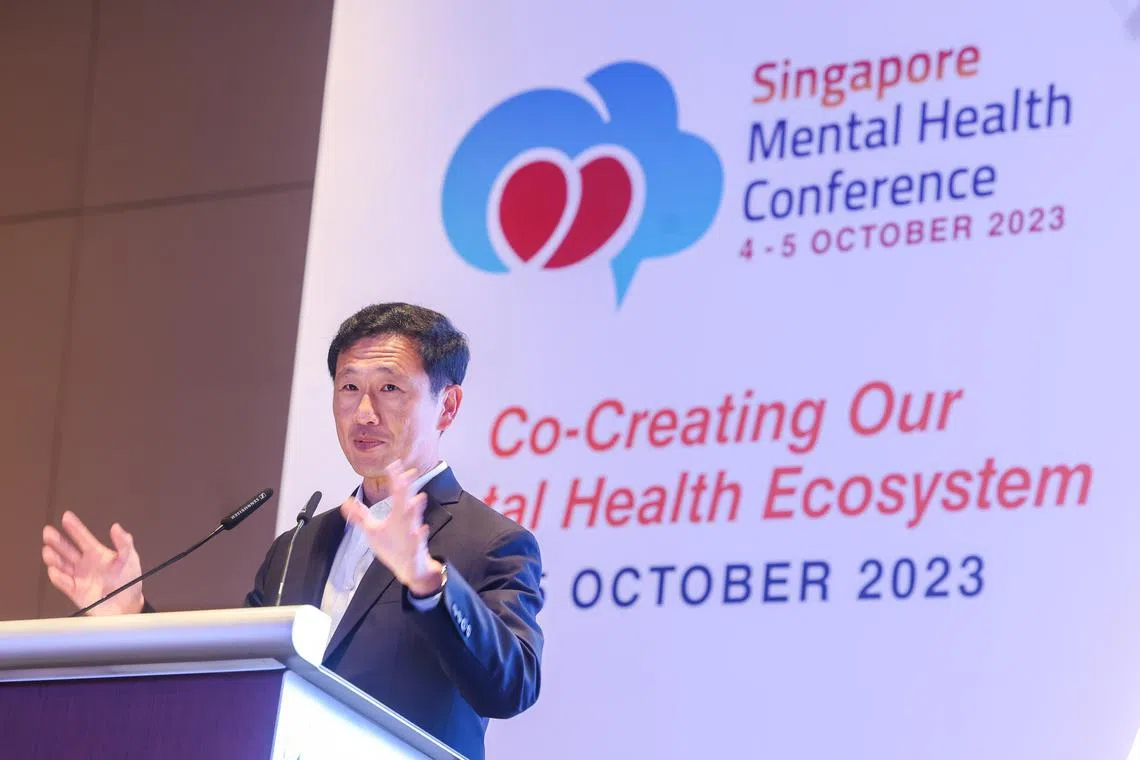S’pore launches national mental health and well-being strategy
Sign up now: Get ST's newsletters delivered to your inbox

In the next two years, more GPs will be roped in to provide mental health services under Healthier SG.
PHOTO: ST FILE
SINGAPORE – Primary care capacity will be increased to meet mental health needs in the next few years. This was announced on Thursday as Singapore launched a National Mental Health and Well-Being Strategy, signalling recognition by the authorities that mental health has become a significant health and social issue.
The strategy’s key thrust is to tackle the issue coherently and holistically, from both preventive and curative perspectives, through the community, schools and workplaces.
In the next two years, more general practitioners (GPs) will be drawn in to provide mental health services under Healthier SG, particularly to help identify those with common conditions like depression and anxiety who may not otherwise seek help.
Currently, 17 out of 24 polyclinics offer mental health services. By 2030, all the new polyclinics will offer such services.
There will also be new initiatives. By 2030, two new psychiatric nursing homes and a psychiatric rehabilitation home will be set up.
There will also be an intermediate residential facility for young people aged 10 to 19 who are at risk of suicide or severe self-harm. These young people may not have mental health disorders but may be experiencing psycho-social stressors such as difficult relationships with family members or romantic partners.
Not only will the Institute of Mental Health’s capacity be expanded, but the future redeveloped Alexandra Hospital will also have inpatient beds for psychiatric care and rehabilitation, as well as paediatric psychiatric services.
A National Mental Health Office will be established by 2025 to oversee the implementation of the strategy and future mental health care developments.
Senior Minister of State for Health Janil Puthucheary, who chairs the Interagency Taskforce on Mental Health and Well-being behind the strategy, said the authorities recognise the need to support individuals who have mental health concerns or issues, but do not necessarily suffer from a disease.
“We want that support to be accessible, and that means we need that support to be available in the community, where people are engaging in their day-to-day work and studies,” he said.
A key part of the strategy is the introduction of a tiered model of care that provides support based on the severity of each person’s needs, across health, social and education settings.
This starts with community-led mental health promotion, self-help and peer support for individuals who encounter distressing events down the road and receive counselling, or stress and anxiety management for those with mild symptoms of mental health conditions.
Those with moderate symptoms might need a mental health assessment or psychotherapy, while those showing severe symptoms will need psychiatric assessment, emergency services and specialised psychological interventions.
“We want to make sure that we use our resources and services appropriately, provide care and care access to all clients, avoid over-medicalising these mental health issues and, ultimately, reduce the stigma,” said Dr Janil.
This comes as the prevalence of mental health issues has increased, with hospitals busy handling pent-up demand from the pandemic and new cases, inevitably leading to queues.
“Today, if you have a process where as long as you have a mental health condition, everybody is in the same queue... then, of course, the resources are not well utilised,” said Dr Janil.
He added that the tiered care model is planned for the capabilities that different personnel and organisations will have. Different services will be available in different locations so that “when someone needs mental health care, we hope that it is then close to them, and not everybody will go and join the same queue”.
This model will take time to be put in place, but the work has already started, he said.
“We don’t necessarily only need mental health care – we need care and the social services’ support and health services’ integration. All of that is important.”
While the capacity of mental health services is being expanded, more front-line personnel are being trained, and efforts are being beefed up to promote mental health and well-being in the community, schools and workplaces.
To make it easier for people to get self-help or access help quickly, a national mental health helpline and text service as a first stop is in the works. This may come in a few years’ time.
Today, there are more than 30 helplines, seven text services and many other services.
Currently, over 90 Community Outreach Teams and Community Intervention Teams have been set up in various social service agencies to support individuals in distress.
In the next two years, about 10,000 more front-line personnel will be trained, adding to the existing pool of over 90,000 volunteers and front-line personnel trained in mental health awareness. Some 1,500 social service professionals will also be upskilled to support mental health needs.
Parents will be drafted to help support their children’s mental health and well-being. A Parents’ Toolbox is expected to be launched in phases from early 2024 to equip them with the skills to help their children.
The Government will also be studying overseas practices to see how best to address the issue of parental consent for children below 21 to seek mental health services.
Set up in 2021, the interagency task force is an expansion of the task force that was first put together to tackle the mental health needs that arose from the pandemic. For the launch of the National Mental Health and Well-Being Strategy, it had included feedback garnered from the public consultation held in 2022, when it received more than 950 responses.
At the Singapore Mental Health Conference on Wednesday, Health Minister Ong Ye Kung said the Government will start incorporating a mental health element in Healthier SG, its preventive care strategy, and in Age Well SG, its national effort to encourage active and healthy ageing in homes and communities.

Health Minister Ong Ye Kung at the opening ceremony of the Singapore Mental Health Conference on Oct 4, 2023.
PHOTO: LIANHE ZAOBAO
“In the coming two years, we will be developing mental health protocols, and incorporating mental health prevention and support as part of the general practitioners’ scope of practice under Healthier SG, just as we have done for many other chronic diseases,” he said.
To date, there are more than 400 GPs who are trained to manage mental health cases and work closely with the Community Intervention Teams and hospitals to meet their patients’ mental health needs. This group will be progressively expanded in the next few years.
With Age Well SG, the authorities plan to keep seniors physically and socially active in the community, as the social isolation of seniors is “a key risk factor of mental illness”, Mr Ong said.
Helplines
Mental well-being
Institute of Mental Health’s Mental Health Helpline: 6389-2222 (24 hours)
Samaritans of Singapore: 1800-221-4444 (24 hours) /1-767 (24 hours)
Singapore Association for Mental Health: 1800-283-7019
Silver Ribbon Singapore: 6386-1928
Tinkle Friend: 1800-274-4788
Chat, Centre of Excellence for Youth Mental Health: 6493-6500/1
Women’s Helpline (Aware): 1800-777-5555 (weekdays, 10am to 6pm)
Aware’s Sexual Assault Care Centre: 6779-0282 (weekdays, 10am to 6pm)
Counselling
TOUCHline (Counselling): 1800-377-2252
TOUCH Care Line (for seniors, caregivers): 6804-6555
Care Corner Counselling Centre: 6353-1180
Counselling and Care Centre: 6536-6366
Online resources
carey.carecorner.org.sg
(for those aged 13 to 25)limitless.sg/talk
(for those aged 12 to 25)



